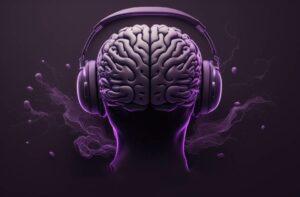The cerebral cortex, often referred to as the cortex, is the outermost layer of the brain, playing a key role in memory, attention, perception, cognition, awareness, thought, language, and consciousness. It is composed of folded grey matter, creating convolutions known as gyri and sulci. These folds increase the surface area of the cortex, enabling higher function processing.
The cortex is divided into two hemispheres, each consisting of four lobes: the frontal lobe, parietal lobe, occipital lobe, and temporal lobe. Each lobe is associated with different functions.
The frontal lobe, located at the front of the brain, is involved in motor function, problem-solving, spontaneity, memory, language, initiation, judgement, impulse control, and social and sexual behaviour.
The parietal lobe, positioned behind the frontal lobe, plays a role in integrating sensory information from various parts of the body, understanding spatial orientation, recognition and perception of stimuli.
The occipital lobe, located at the back of the brain, is primarily involved in visual perception, including colour recognition and motion perception.
The temporal lobe, situated beneath the frontal and parietal lobes, is associated with processing auditory information, encoding memory, and managing emotions.
The cerebral cortex is a complex and vital structure that facilitates a wide range of high-level cognitive functions. Its intricate network of neural connections enables us to interact with and understand our environment, form memories and thoughts, and engage in detailed processing.
Cerebral cortex
The functions of the different lobes of the cerebral cortex include:
* Frontal lobes: Responsible for higher cognitive functions, such as planning, decision-making, problem-solving, and self-control. Also involved in the regulation of emotions and social behaviour.
* Parietal lobes: Process sensory information from the body, such as touch, temperature, and pain. Involved in spatial awareness and coordination.
* Temporal lobes: Play a key role in memory formation and the processing of auditory information. Also involved in language comprehension and emotional regulation.
* Occipital lobes: Dedicated to the processing and interpretation of visual information.
* Frontal lobes: Responsible for higher cognitive functions, such as planning, decision-making, problem-solving, and self-control. Also involved in the regulation of emotions and social behaviour.
* Parietal lobes: Process sensory information from the body, such as touch, temperature, and pain. Involved in spatial awareness and coordination.
* Temporal lobes: Play a key role in memory formation and the processing of auditory information. Also involved in language comprehension and emotional regulation.
* Occipital lobes: Dedicated to the processing and interpretation of visual information.
Understanding the cerebral cortex can help with mental self-help by:
* Providing insight into the neural basis of thoughts, emotions, and behaviours, allowing individuals to appreciate the interconnectedness of their mental experiences.
* Highlighting the importance of maintaining brain health through lifestyle factors, such as diet, exercise, and sleep, which can support cognitive function and emotional well-being.
* Informing the development of targeted strategies to improve specific cognitive skills or emotional regulation, based on an understanding of the functions and interactions of the cerebral cortex.
* Providing insight into the neural basis of thoughts, emotions, and behaviours, allowing individuals to appreciate the interconnectedness of their mental experiences.
* Highlighting the importance of maintaining brain health through lifestyle factors, such as diet, exercise, and sleep, which can support cognitive function and emotional well-being.
* Informing the development of targeted strategies to improve specific cognitive skills or emotional regulation, based on an understanding of the functions and interactions of the cerebral cortex.
Yes, lifestyle factors can influence the health and function of the cerebral cortex:
* Diet: Consuming a nutrient-rich diet, including foods rich in antioxidants, omega-3 fatty acids, and other essential nutrients, can support brain health and cognitive function.
* Exercise: Regular physical activity can enhance blood flow to the brain, support the growth of new neurons, and improve neuroplasticity.
* Sleep: Adequate sleep is essential for memory consolidation, emotional regulation, and the overall health of the cerebral cortex.
* Stress management: Implementing stress-reduction techniques, such as meditation, deep breathing exercises, or yoga, can help protect the cerebral cortex from the detrimental effects of chronic stress.
* Cognitive stimulation: Engaging in mentally stimulating activities, such as learning new skills, solving puzzles, or socialising, can promote the health and function of the cerebral cortex.
* Diet: Consuming a nutrient-rich diet, including foods rich in antioxidants, omega-3 fatty acids, and other essential nutrients, can support brain health and cognitive function.
* Exercise: Regular physical activity can enhance blood flow to the brain, support the growth of new neurons, and improve neuroplasticity.
* Sleep: Adequate sleep is essential for memory consolidation, emotional regulation, and the overall health of the cerebral cortex.
* Stress management: Implementing stress-reduction techniques, such as meditation, deep breathing exercises, or yoga, can help protect the cerebral cortex from the detrimental effects of chronic stress.
* Cognitive stimulation: Engaging in mentally stimulating activities, such as learning new skills, solving puzzles, or socialising, can promote the health and function of the cerebral cortex.
Related Semantic Entities for Cerebral cortex

